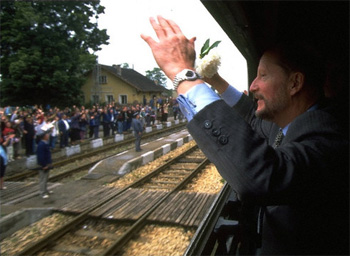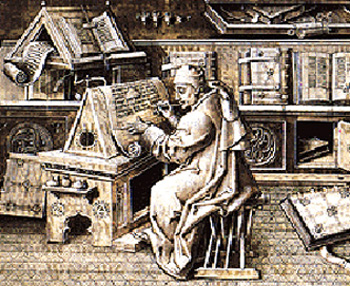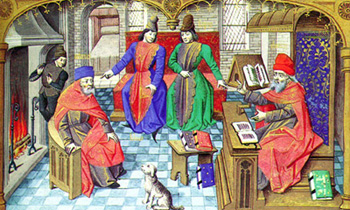 |
Organic Society
How Ghosts & Myths Influence
the Psychology of a People
Plinio Corrêa de Oliveira
In the United States, the English Royal family enjoys a great prestige. Countless Americans have an interest in what the royals do and unconsciously hold up the royals as models of class and good taste to be imitated. Nonetheless, in their political convictions Americans are very republican. They are so ardent about their separation from England that even the Anglican church in the U.S. had to change its name to Episcopalian after the War with England in order not to remind them of their old dependence.

The Duke and Duchess of Cambridge receive a red carpet welcome in Los Angeles, 2011 |
How, then, can it be explained that when members of the Royal Family visit the U.S. it becomes a news item that attracts great attention. Everything they do is followed with the kind of interest paid to popular movie stars.
I would explain this by saying that a “ghost” of the monarchy remains in the American mentality and nourishes this interest in the royals. What do I mean by “ghost”? It is a state of spirit, a nostalgia, a sympathy; it is a hope not entirely based on reason that has that strong resilience habits have. It is not a rational conviction, but it can acquire some characteristics of the splendor and the beauty of an ideal. Some sociologists would call it a myth. I would say that is a species in the genre of the myths.
Some peoples of the Balkans, who were forced to become communist by the impositions of the treaties of Yalta and Potsdam, to this day have a nostalgia for the Habsburgs, for the ancient Austro-Hungarian dual monarchy they used to be under, or for their own independent monarchies, depending on the case. This in part explains why, after the fall of the Iron Curtain, these countries are inviting their old royal families, who were living in exile, to return. They are returning some of the properties expropriated by the communists from the royal families and inviting them to assume prestigious positions in the political and social lives of their countries.
Unlike a monarchist party, they do not strive to restore the monarchy. They just want to restore their old royal families to places of honor and dignity. The ghosts of their old monarchies are working subconsciously in the mentalities of these peoples.
I would say that when a people’s myth or custom is for some reason suddenly uprooted, a nostalgia remains in the form of a ghost.
The role of myths in the birth of the Roman Empire
In an organic society, there is an interaction between the birth of a people and their unanimous adhesion to some myths. Understanding this is one of the most interesting and most mysterious subjects that we can study in the history of peoples.

The people welcome King Simeon II back to Bulgaria after a 50 year exile |
In the small cells that give birth to larger units – those groups of families that become clans – all the members have certain semi-religious convictions that they accept as evident. They base their history on belief in some apparition or revelation - often false and erroneous - mixed with local legends. This belief is not based on articulated facts. However, even without documents or evidence of any sort, they believe in that myth as an evident fact. There is a curious unanimous consensus of belief that is not rational, but is admitted by all as indisputable.
The religious-social customs generated by that belief bear a seed that can develop much further, even into a utopia. If for any reason this myth-conviction or utopia is uprooted, it is not destroyed; it remains in state of ghost. For example, almost all of the pagan clans have consuetudinary laws born from customs of this type.
As a society gets larger, its law develops based on those first convictions held unanimously. Through the process of growth and maturation, the members of the group do not demand a rational foundation for those beliefs. It is not even a matter of discussion among them. Those first “facts” about themselves are assumed as evident.
Like the other ancient pagan peoples, the Romans were born from the union of small groups of families who lived in rural territories and married among themselves. Then, members of group A started to marry members of a similar group B, then C and D. These small groups of inter-related families formed a cluster of persons linked by family bonds. When the numbers of persons living in these rural groups became large, they had the tendency to establish a center for their groups: This led to the birth of the city. Thus, the rural groups came to be structured around the city. This describes the origins of Rome.
Quirinus was an old Roman god more or less identified with Romulus, the legendary founder of the city. The legislation in the first legal system in Rome was called Ius Quiritium, or Quiritian Law. These laws were applied to those first inhabitants who adored Quirinus. But, as other peoples came to Rome, the judges realized that they could not apply the same law to both these first citizens and the immigrants, since the latter had their own gods and myths or none at all.
Thus, Rome became a large city with two types of inhabitants: the Quiritarians, the old followers of Quirinus who had founded the city and who represented the noble class, and the other inhabitants of different origins who had come to live in Rome. The latter included every type of man, from good manual workers to adventurers, freed slaves and criminals. The old nobility kept itself apart from this new class. Consequently, two types of law came into existence: one for the old citizens of Rome who adored Quirinus, and another to govern the others. The first was the Ius Quiritium, and the second, the Ius Gentium, the Law of the Nations applied to outsiders.
The Ius Gentium eventually came to be applied to the whole Roman Empire. It became so perfect, providing so well for the rights and needs of the peoples, that it became an excellent mirror of Natural Law. It became much better than the laws which applied specifically to the Roman patricians, a complicated web of exceptions, privileges and contradictions. Later, the patricians themselves abandoned the Ius Quiritium and replaced it with the Ius Civile, their Civil Law, with many parts taken from the Ius Gentium.

Gratian compiled the Church's laws in the Middle Ages |
This law was so well done that the Church judged it had many natural developments of the Ten Commandments. When the Church left the catacombs, she adopted that Roman Law, purified it of its pagan errors and made it the Law par excellence. She also applied it to herself and made it the base of her Canon Law. It was this purified Roman Law that medieval men adopted as a good fruit of Roman Civilization to be conserved. Until today in Faculties of Law, Roman Law is taught as the foundation of all civilized law. No one would think of teaching the law of the Upanishads, Vedas or Incas to instruct students. It was the genius the Romans had for law that made their Roman Law universal.
Therefore, what started as a flawed pagan religious myth in the beginning of Rome’s history generated customs and laws that governed the whole city of Rome. This law, because of unique historic circumstances, generated the Ius Gentium and the Jus Civile, which would be the best fruits of Roman Civilization.
The ghost of the Empire after its fall
Roman Law was also a consequence of the Roman ideal of Empire. Since the Romans lacked the easy means of communication we have today, their Empire highly respected the regional autonomies and cultures of each of its provinces and did not interfere in the local customs. Thus, in many points their Empire was in accordance with Natural Law.
Someone might ask me: After the barbarians destroyed the Roman Empire in the West, was it its ghost that gave birth to the Holy German-Roman Empire?
In a certain way one could say yes, in another way, no.
The Roman Empire had been dead for more than 300 years when Charlemagne was crowned in the year 800. That was a long period of time. Someone could say it was the ghost of the Roman Empire that hovered through the centuries over those destroyed Roman cities and barbarians tribes. So, he would say that it was this ghost that inspired the rebirth of the Empire.
On the other hand, when Pope St. Leo II crowned Charlemagne, he wanted Charlemagne to take on the office of Emperor that was empty, and not to make another Empire. At that time almost everyone considered the Roman Empire as still alive - and actually it was quite alive in the East. As far as I can see, everybody accepted Charlemagne as a new Roman Emperor. Charlemagne himself viewed things this way. This is why the Holy Roman-German Empire had the name Roman in it.
Although the political reality that emerged became much richer and more perfect than the Roman Empire, because it was turned toward the glory of God and the exaltation of the Church, its natural ideal and root were that of the Roman Empire. Hence, I would say that it is not properly speaking a ghost, but a continuation of the same natural ideal.

The influence of the Legists made the Univerity of Bologna, above, famous for its teaching of Roman Law |
If you want an example of a less disputable Roman ghost, we have the ghost of Roman Law that was manipulated by the Legists, a school of jurists at the end of the Middle Ages, a sort of Freemasonry, which interpreted Roman Law in a theoretical and artificial way. The organic structure of the Medieval State had become quite different from that of the Roman State. Feudalism was a system that fostered small political units and regional characteristics incomparably more than the Romans. Each kingdom of Christendom was a mosaic of organic units that developed their asseitas as much as possible.
It was to destroy that magnificent political order that the Legists strove to restore Roman Law. So they used the ghost of Roman Law to advocate the centralization of power in the hands of the Monarchs and to implant a uniform law for all. They twisted Roman Law to suit their revolutionary purposes. From this revolutionary movement Modern Law was born with all its
deformations.
Continued

Posted February 6, 2012

  | | Prof. Plinio |
Organic Society was a theme dear to the late Prof. Plinio Corrêa de Oliveira. He addressed this topic on countless occasions during his life - at times in lectures for the formation of his disciples, at times in meetings with friends who gathered to study the social aspects and history of Christendom, at times just in passing.
Atila S. Guimarães selected excerpts of these lectures and conversations from the transcripts of tapes and his own personal notes. He translated and adapted them into articles for the TIA website. In these texts fidelity to the original ideas and words is kept as much as possible.

Related Topics of Interest
 Discerning the Dynamism of Individuals & Peoples Discerning the Dynamism of Individuals & Peoples
 Discerning the Historic Roles of Nations Discerning the Historic Roles of Nations
 Peoples who Disappear, Peoples who Remain Peoples who Disappear, Peoples who Remain
 How a People Fulfills its Vocation How a People Fulfills its Vocation
 Customary Law & Roman Law Customary Law & Roman Law
 Customary Law Is the Charm of a Catholic State Customary Law Is the Charm of a Catholic State
 Definitions, Examples, Nuances of Different Societies Definitions, Examples, Nuances of Different Societies
 Does Authority Represent God or the Sovereign People? Does Authority Represent God or the Sovereign People?

Related Works of Interest
|
|
Organic Society | Social-Political | Home | Books | CDs | Search | Contact Us | Donate

© 2002-
Tradition in Action, Inc. All Rights Reserved
|
 |
|